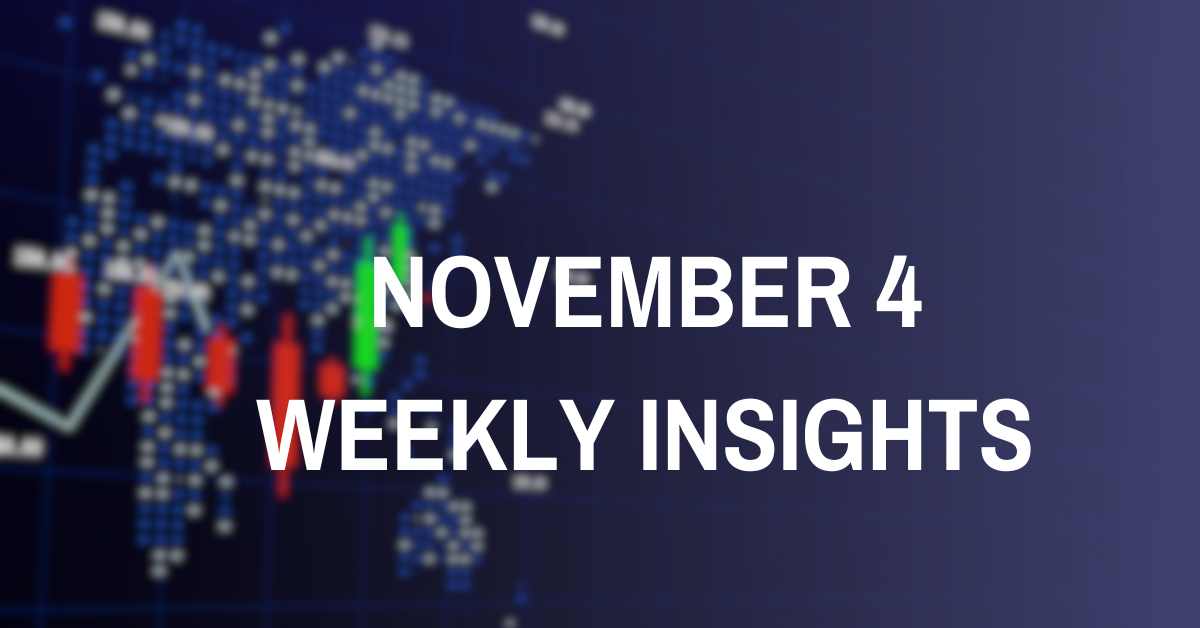Welcome to our weekly market outlook. In this edition, we’ll discuss recent market movements, emerging trends, and the forecasts shaping the upcoming week. We will explore key developments across financial markets, market risk factors, and the ongoing global economic sentiment that is guiding market expectations.
Summary of Last Week’s Market Movement
The markets exhibited mixed signals last week, heavily influenced by ongoing geopolitical tensions and macroeconomic data. A slower-than-expected disinflation process in the U.S. has tempered expectations for significant Federal Reserve rate cuts, as the September Consumer Price Index (CPI) showed mixed results. This data led to slower Fed rate cut expectations, keeping the U.S. dollar resilient.
In Europe, market sentiment was dominated by the ECB’s anticipated rate cut, which has already been priced in by the market, putting pressure on the euro. The UK saw increased pressure on the pound due to expectations of a fall in September’s CPI.
Geopolitical tensions in the Middle East continued to support gold prices, with investors flocking to safe-haven assets amidst uncertainty. Oil prices remained elevated due to Chinese stimulus measures and heightened geopolitical risks, which are sustaining concerns about oil supply. Bitcoin saw a price surge, but profit-taking by investors has limited the appreciation of the cryptocurrency.
Key Highlights of This Week
•Interest Rates and Market Sentiment: Shifting expectations around interest rates continue to shape market sentiment. The FOMC’s latest meeting minutes indicated ongoing debates, but the likelihood of aggressive rate cuts has diminished. This week, the market will focus on speeches from key Federal Open Market Committee (FOMC) members like Fed Waller and Kashkari.
•Emerging Markets Performance: Chinese economic data showed mixed results, with new loans increasing but industrial activity under pressure. The market is closely watching for signs of recovery, particularly as Chinese authorities implement more aggressive fiscal measures. The Hang Seng Index (HK50) saw some recovery following JD.com’s promotions and Baidu’s expansion plans.
•Gold and Oil Markets: Gold prices continue to hover around resistance levels, supported by increased demand for safe-haven assets. Oil markets are volatile, with price gains driven by both Middle East geopolitical tensions and Chinese government stimulus. The potential for disruptions in production continues to pose a risk to oil price stability.
For an in-depth understanding of risk management strategies, visit: Comprehensive Guide to Risk Management in Trading
Economic Outlook for the Week
This week’s economic outlook remains heavily centered on critical market data and monetary policy. Below, we outline the major highlights that investors should monitor:
•U.S. Economic Data: All eyes are on upcoming CPI data, set to be released on Thursday. A strong reading would dampen hopes for a Fed rate cut, while weaker data could reignite those hopes. Additionally, speeches from key FOMC members, including Daly and Bostic, will be crucial for understanding the direction of U.S. monetary policy.
•ECB Rate Decision: Market sentiment in Europe is cautious, with expectations of an October rate cut of 0.25% by the ECB. This potential cut aims to counter low inflation and economic struggles, but the impact on the euro is expected to be minimal since much of this has already been priced in by the markets.
•Chinese Economic Activity: Economic data from China will provide fresh insights into the impact of recent stimulus measures. The focus will be on how effective the stimulus has been in reviving consumer spending and stabilizing industrial production.
Learn more about how algorithmic trading can provide a strategic edge: Complete Guide to Algorithmic Trading
Key Assets Outlook
•US Dollar Index (DXY): The dollar index remains on an upward trajectory, supported by stronger-than-expected U.S. economic data. The likelihood of a substantial rate cut seems low, and this stance should continue to provide support to the dollar.
•Gold (XAUUSD): Gold prices continue to be buoyed by geopolitical tensions and mixed economic data. The price is expected to test resistance at $2,780 if upward momentum persists, while downside risk remains if stronger-than-expected U.S. economic data emerges.
•Oil (USOIL): Oil prices have climbed over the past two weeks due to heightened geopolitical risks and ongoing production disruptions. Traders are also watching the upcoming OPEC+ meeting for any changes in production targets.
•Nasdaq 100 (USTEC): The Nasdaq 100 index rose by 2.4% last week, driven by investor optimism in tech stocks and an overall resilient labor market. Corporate earnings this week will be a key determinant in whether this index continues its bullish trend.
•Bitcoin (BTCUSD): Bitcoin has experienced a price surge, although profit-taking has limited its appreciation. Investor sentiment remains cautiously optimistic, with higher inflows seen in bitcoin ETFs signaling growing confidence.
Emerging Markets Update
Emerging markets are grappling with mixed signals from both local and global economic policies. China has committed to additional stimulus measures, and while recent PMI data has shown contraction, the market is hopeful that the measures will soon yield positive results. Hong Kong’s market rallied due to JD.com’s latest promotional strategies and Baidu’s expansion beyond China.
In Japan, political uncertainty combined with mixed data from the Bank of Japan has left the yen’s outlook uncertain. Monetary policy in Japan remains cautious, with potential rate hikes on the horizon, depending on upcoming economic data.
For a deeper understanding of financial market indicators, visit: Understanding Financial Market Indicators
European Markets and Sector Trends
European markets are expected to remain under pressure this week. The ECB’s expected rate cut, combined with mixed data from Germany and France, suggests a continued environment of tempered growth. The German economy showed an uptick in industrial production, but broader indicators point to slower economic progress. Investors are now keenly awaiting the ECB’s decision and any additional measures that might follow.
Market Risk and Sentiment
Market risk remains high due to a combination of geopolitical tensions and monetary policy uncertainties. The Eurozone is facing increased pressure, with inflation below target and economic activity showing slow recovery. Meanwhile, the Federal Reserve appears cautious but steady in its approach to rate adjustments. Investor sentiment is mixed, with concerns over the ongoing Middle East crisis and the potential impact on global energy supply.
Weekly Market Impact
This week is expected to be marked by significant geopolitical and economic impacts. The ongoing conflicts in the Middle East are likely to affect energy markets, while central bank commentary will provide further guidance on future rate cuts. The ECB’s upcoming rate decision and the Fed’s remarks will be critical for determining market movement, particularly in the fixed income and equity markets.
Outlook and Rate Cut Expectations
The outlook for the coming months remains highly dependent on geopolitical developments and central bank actions. Expectations for rate cuts by the ECB are high, although the market has largely priced in these expectations, reducing their immediate impact. Long-term investors are focusing on sectors that are likely to benefit from accommodative monetary policies.
Conclusion
This week presents a challenging yet opportunity-filled market environment. The focus remains on macroeconomic data, central bank decisions, and the unfolding geopolitical landscape. Investors are advised to stay informed, particularly about changes in monetary policies, as these could significantly impact market risk and sentiment.
If you’re interested in leveraging our algorithms to beat the market, explore: Unlock the Power of Algorithmic Trading with Topaz Global’s BOLD Algo.




